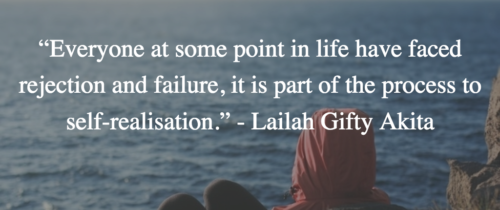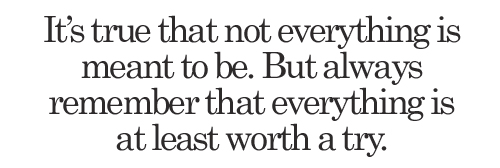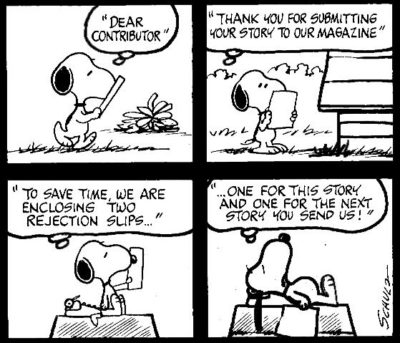
A fear of rejection limits our potential and stops us from expressing our talents. This post describes the root cause of our fears of rejection and five steps that you can take to overcome it. (Estimated reading time: 7 minutes)
“Everything you want is on the other side of fear.”
— Jack Canfield
Rejection – the very thought of it will send many of us running for the hills. Yet no matter how hard you try to escape it, it will catch up with you because it’s a fundamental aspect of the human experience.
This deep sense of vulnerability can be traced back to our childhood days. The fear of rejection is especially stronger during these years because we haven’t yet developed a sense of self.
A kid on her first day at school would rather run back home into the safe arms of her mother than make new friends. A teenager is willing to do pretty much anything to be accepted by the cool crowd in his high school.
As grown-ups, most of us still feel just as anxious as we did when we were kids and teenagers. The severity of our vulnerability depends on our own unique life circumstances and how much we have invested in our personal development.
While we’re all painfully aware of what the fear of rejection feels like, we don’t really have an objective understanding of its origins.
Like other types of fears, it’s irrational and based on the assumption that people won’t accept you. You may be worried that they won’t accept your opinions, beliefs or behavior. Most of the time, fears are usually unfounded.

But no matter how much we try to rationalize it, it still feels very real to us, because this fear has its roots in the very primitive part of our brains. Rejection is one of our deepest human fears because we’re biologically wired with a need to belong and to be loved. We’re terrified at the thought of being cut off and isolated, and we want to be accepted for who we are.
In ancient tribes, being ostracized was as good as a death sentence because of how dependent the members were on each other when it came to their survival. A baby that isn’t shown signs of love and affection such as being held, nuzzled or hugged can literally stop growing and might even die, even with proper nutrition! On both an instinctive and social level, we know that rejection is bad news.
It’s no wonder that we get distraught at the mere possibility of being rejected by someone. After all, who wants to feel like they are unlovable or not good enough? No one does! But the reality is that you will encounter circumstances and people that will trigger these fears and you’ll need the right coping mechanisms, if you would like to come out of them unscathed.
If left unchecked, the fear of rejection can have a debilitating effect on your inner peace and negatively impact your decisions. It can also cause you to be excessively needy in relationships and vulnerable to being manipulated and taken for granted by others. Remember that the more fragile your ego is and the lower your self-esteem, the greater your fear of rejection will be.

The truth is that we can never really get rid of the fear. We can only learn how to manage it – knowing how to do this is an essential ingredient of success. Almost everyone who has become recognized for some talent, discovery or idea has faced rejection on the path to success. Even though they experienced the demoralizing effects of rejection, they didn’t let it get to them, and they kept going.
A recording studio prophesized that The Beatles would have no future in show business. Michael Jordan was cut out from his high school basketball team. A newspaper told Walt Disney that he lacked imagination and had no original ideas. Oprah Winfrey was demoted from her job because a news anchor thought that she wasn’t fit for television. Rowling’s Harry Potter was rejected by 12 different publishers.
The list of famous people who were rejected is virtually endless! While each of one of them is undoubtedly talented, what got them to the finish line was their ability to push through the discouragement from rejection and to not allow it to define their worth and their abilities. They continued to move forward, not allowing someone else’s opinions to determine their destiny.

Now, I’m not saying that facing rejection should be treated as a trivial matter. It can sting, especially when it comes to matters that are important to you. As a creative professional, I had to learn to face my fears head on. It was hard when I first started. I found myself being upset by mean comments left on my blog or social media pages, or every time someone unsubscribed from my list.
Eventually, I realized that there will always be critics and naysayers who’ll be happy to rain on my parade, but it’s essential that I don’t give them any power and let their judgments have any sort of bearing on my creative abilities. What matters is that I continue to express my truth and maintain my focus on delivering quality content that will continue to enrich the lives of people who do appreciate my work.
The truth is that if you want to play a bigger game in life, you have to be willing to take healthy risks and put yourself out there, because success is a numbers game. We’re less likely to do this if we’re constantly worried about what others think of us.

The good news is that when you commit yourself to doing the inner work, you can easily push past the fear. Here are some steps that you can take to reach this empowering place:
1. Heal past hurts: People tend to fear rejection more if they haven’t properly dealt with the lingering pain from past experiences where they were hurt. The wounds caused from feeling rejected in our youth will continue to linger in our subconscious minds. These festering thoughts of not being good enough can paralyze us as adults. You’ll get triggered by others’ behaviors and words because of your sensitivity about these unresolved issues. It’s almost like someone is touching an open wound, which will hurt much more because it’s still hurting.
For example, if your former partner left you for someone else in your last relationship, the chances are high that you will feel insecure and anxious in your next relationship if you haven’t done the inner work to heal from this past betrayal. If you want to prevent people from having the power to push your buttons, you have to be willing to probe into your issues and deal with them appropriately. You can gain more awareness about your fear and how it’s affecting your life by journaling and working with a qualified therapist who can help you work through the issues.
2. Acknowledge yourself and get in touch with your true worth: It’s critical that we maintain a healthy relationship with ourselves if we would like to be strong enough to deal with rejection. A big part of that involves committing to speaking to ourselves with compassion, just as we would speak to someone that we love. Fear-based thoughts are usually accompanied with the harsh internal dialogue of our inner critic, which causes us to feel like we aren’t good enough and that we lack in some way. When you’re in touch with your value and you believe in yourself, your fear diminishes. You’re also less likely to take rejection personally.
3. Release expectations and attachment to outcomes: Although it’s important to have clarity on end goals, we also need to develop a healthy detachment from the result of our actions. Putting ourselves out there is tough enough and getting overly attached to the outcomes that we desire makes it even tougher. While it’s okay to have high expectations, we want to be careful about involving our emotions, because once we do, we put ourselves in a vulnerable position. I know that this is easier said than done, especially in matters that are close to your heart, but you’ll find that with practice, the art of surrendering will come to you more naturally.
4. Develop a healthier outlook on rejection: It can be tempting to make rejection appear to be scarier than it really is. Like little kids in the dark, we see rejection as a monster that’s lurking in the shadows, ready to pounce on us. Just like kids, we create these imaginary projections from our fears and give them too much significance. But rejection does not have to be viewed from the lens of drama and finality. We can shift our perspective on rejection towards one that is healthier and more conducive to the evolution of our consciousness. What if we saw rejection as nothing but useful feedback? If we can analyze things objectively, we could learn a lot of valuable insights, which we can use to tweak our strategy.
For instance, if your job applications repeatedly get rejected, perhaps you need to change something about your resume or how you show up at interviews. Keep getting turned down for dates? Maybe you need to change your approach, attitude or enhance your appearance to become more appealing to others.
Your experiences of rejection will give you opportunities to strengthen your resolve. As gain strength, you’ll be no longer be intimidated by rejection, and you’ll feel empowered to show your talents to the world.
All my best on your journey,
Seline

Question for you: How often do you experience a fear of rejection? Are there certain types of situations where you experience it the most?
Did you like this post? Sign up below and I’ll send you more awesome posts like this every week.

hey seline, I enjoyed reading your post.
I am a writer so I had to learn very early on to overcome the fear of rejection- you get a hundred rejection letters before one acceptance letter and you cannot let it discourage you!
So I love your message to keep pressing on and trying and growing and never give up on your dream and never change who you are!
True Katherine…especially in artistic professions where you have to really work towards getting a break. Keep honing your skills and getting better at your craft and sooner or later people will notice. I wish you the best of luck! – Seline